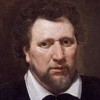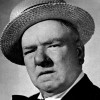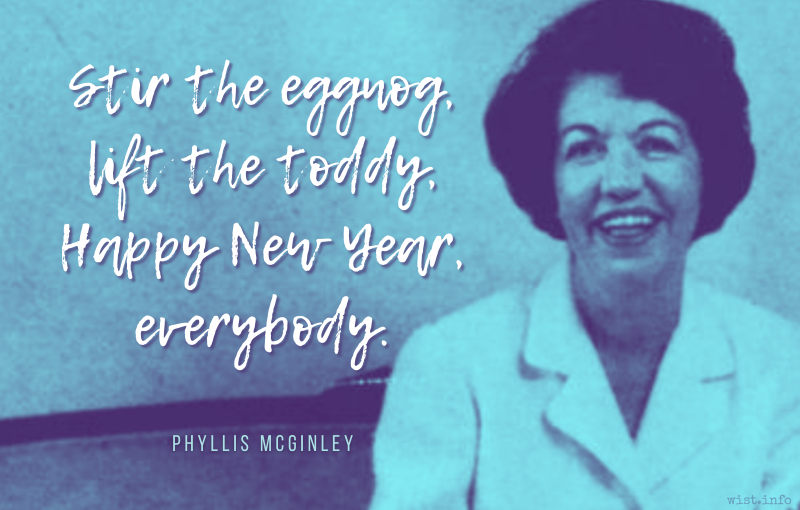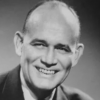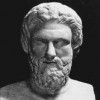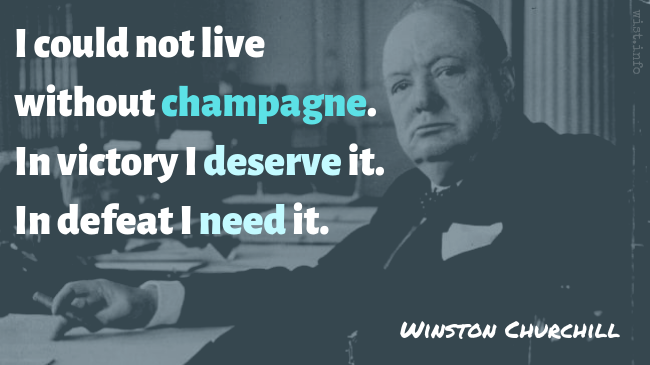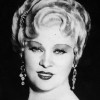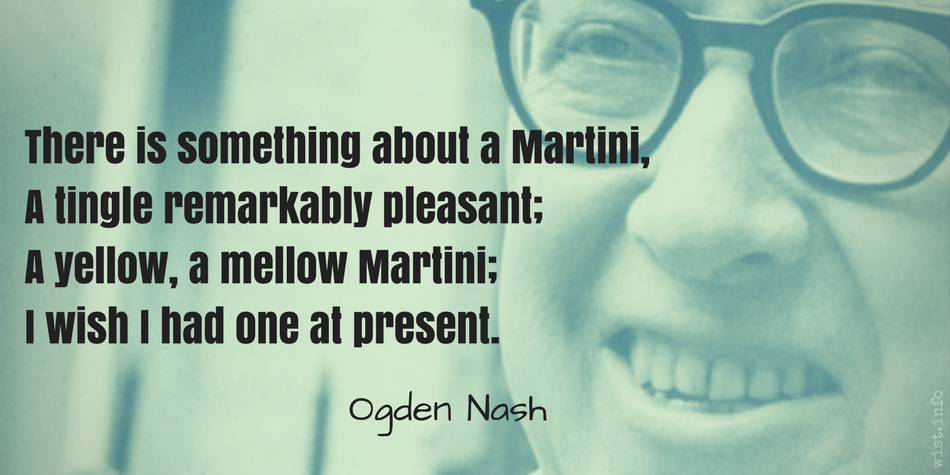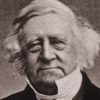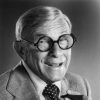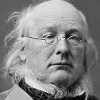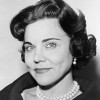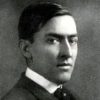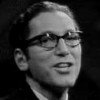A bibulous poet downed
his every glass in one;
so warned him his companion
“Stop — that’s enough, son.”
About to lose his balance
He said, “I know my stuff.
It’s one thing to drink too much,
but one never drinks enough.”[Ein trunkner Dichter leerte
Sein Glaß auf jeden Zug;
Ihn Warnte sein Gefährte:
Hör’ auf! du hast genug.
Bereit vom Stuhl zu sinken,
Sprach der: Du bist nicht klug;
Zu viel kann man wohl trinken,
Doch nie trinkt man genug.]Gotthold Lessing (1729-1781) German playwright, philosopher, dramaturg, writer
“Answer of a Drunken Poet [Antwort eines trunknen Dichters],” Lieder, Book 1 (1771) [tr. Conlin]
(Source)
Conlin titled his version, "A Bibulous Poet."
Usually just the last two lines are quoted, e.g., "One can drink too much, but one never drinks enough" [ed. Bartlett (1964)] or "One may well drink too much, but yet one never drinks enough" [Source].
(Source (German)). Alternate translations:
A drunken poet emptied
His glass at every draft;
And him his friend admonished,
Cease now! Enough you've quaffed.
But from his chair a-sinking
He said: "You are not wise;
Too much one may be drinking
Yet never what satisfies."
[tr. Fischer (c. 1885), "Answer of a Drunken Poet"]
A drunken poet emptied
His glass with every gulp;
His companion warned him:
Cease! you have had enough.
Ready to fall off his stool,
He said: You are not wise!
Truly, one can drink too much,
Yet one can never drink enough.
[tr. Krebs (2012), "The Answer of a Drunken Poet"]
A drunken poet emptied
His glass with hefty swig;
His companion warned him:
Hey! enough of that, you pig.
Almost toppling from his stool,
He said: That's incorrect!
Ah yes, one can drink too much,
But enough? That I expect.
[tr. Bachlund, "A Drunken Poet"]
A drunken poet quickly drained
His glass, drawing this rebuff,
Being warned by his companion:
"Stop it! you've drunk enough."
Poised to topple out of his chair,
He cracked: "Clever, you're not!
One can always drink too much,
But enough can never be got.
[tr. Bachlund (2012), "Response (of a Drunken Poet)"]
Quotations about:
alcohol
Note not all quotations have been tagged, so Search may find additional quotes on this topic.
O my brave men! stout hearts of mine!
who often have suffered worse calamities with me.
let us now drown your cares in wine.
Tomorrow we venture once again upon the boundless sea.[O fortes peioraque passi
mecum saepe viri, nunc vino pellite curas;
cras ingens iterabimus aequor.]Horace (65-8 BC) Roman poet and satirist [Quintus Horacius Flaccus]
Odes [Carmina], Book 1, # 7, l. 30ff (1.7.30-32) (23 BC) [tr. Alexander (1999)]
(Source)
To L. Munatius Plancus. Quoting Teucer to his crew on his being exiled from Salamis.
Quoted in Montaigne, 3.13 "On Experience" (immediately following this).
(Source (Latin)). Alternate translations:
Brave Spirits, who with me have suffer'd sorrow,
Drink cares away; wee'l set up sails to-morrow.
[tr. "Sir T. H.," Brome (1666)]
Cheer, rouze your force,
For We have often suffer'd worse:
Drink briskly round, dispell all cloudy sorrow,
Drink round, Wee'l plow the Deep to-morrow.
[tr. Creech (1684)]
Hearts, that have borne with me
Worse buffets! drown today in wine your care;
To-morrow we recross the wide, wide sea!
[tr. Conington (1872)]
O gallant heroes, and often my fellow-sufferers in greater hardships than these, now drive away your cares with wine: to-morrow we will re-visit the vast ocean.
[tr. Smart/Buckley (1853)]
Now, ye brave hearts, that have weather'd
Many a sorer strait with me,
Chase your cares with wine, — to-morrow
We shall plough the mighty sea!
[tr. Martin (1864)]
Brave friends who have borne with me often
Worse things as men, let the wine chase to-day every care from the bosom,
To-morrow -- again the great Sea Plains.
[tr. Bulwer-Lytton (1870)]
My comrades bold, to worse than this
Inured, to-morrow brave the vasty brine,
But drown to-day your cares in wine.
[tr. Gladstone (1894)]
O brave friends, who have oft with your leader
Suffer'd worse trials, cheer up, let sorrows dissolve in the wine-cup,
We will try the vast ocean to-morrow.
[tr. Phelps (1897)]
O brave men, often worse things ye with me
Have borne, now drive with wine your cares away,
To-morrow we will sail the wide sea once again.
[tr. Garnsey (1907)]
To-night with wine drown care,
Friends oft who've braved worse things with me than these;
At morn o'er the wide sea once more we'll fare!
[tr. Marshall (1908)]
O ye brave heroes, who with me have often suffered worse misfiprtunes, now banish care with wine! To-morrow we will take again our course over the mighty main.
[tr. Bennett (Loeb) (1912)]
With wine now banish care;
Worse things we've known, brave hearts; once more
we'll plough the main tomorrow morn.
[tr. Mills (1924)]
You who have stayed by me through worse disasters,
Heroes, come, drink deep, let wine extinguish our sorrows.
We take the huge sea on again tomorrow.
[tr. Michie (1964)]
O my brave fellows who have gone through worse
Than this with me, now with the help of wine
Let's put aside our troubles for a while.
Tomorrow we set out on the vast ocean.
[tr. Ferry (1997)]
O you brave heroes, you
who suffered worse with me often, drown your cares with wine:
tomorrow we’ll sail the wide seas again.
[tr. Kline (2015)]
An evil doom of some god was my undoing, and measureless wine.
[ἆσέ με δαίμονος αἶσα κακὴ καὶ ἀθέσφατος οἶνος.]
Homer (fl. 7th-8th C. BC) Greek author
The Odyssey [Ὀδύσσεια], Book 11, l. 61 (11.61) [Elpenor] (c. 700 BC) [tr. Murray (1919)]
(Source)
Odysseus first encounter in the Underworld is the shade of his comrade Elpenor, whose body had been left on Circe's island. This is Elpenor's explanation of his death (10.552-560). Drunk with his crew mates, he climbed a ladder to the roof of Circe's palace to sleep it off. When he heard his friends preparing to leave, he either fell from or forgot about using the ladder, plummeting to his ignominious death.
(Source (Greek)). Alternate translations:
In Circe’s house, the spite some spirit did bear,
And the unspeakable good liquor there,
Hath been my bane.
[tr. Chapman (1616)]
I had come along with th’ bark,
But that the Devil and excess of wine
Made me to fall, and break my neck i’ th’ dark.
[tr. Hobbes (1675), l. 54ff]
To hell my doom I owe,
Demons accursed, dire ministers of woe!
My feet, through wine unfaithful to their weight,
Betray'd me tumbling from a towery height.
[tr. Pope (1725)]
Fool’d by some dæmon and the intemp’rate bowl.
[tr. Cowper (1792), ll. 69-70]
I died
By stroke of fate and the dread fumes of wine.
[tr. Worsley (1861), st. 9]
Ill fate destroyed me, and unstinted wine!
[tr. Bigge-Wither (1869)]
An evil doom of some god was my bane, and wine out of measure.
[tr. Butcher/Lang (1879)]
God's doom and wine unstinted on me the bane hath brought.
[tr. Morris (1887)]
Heaven's cruel doom destroyed me, and excess of wine.
[tr. Palmer (1891)]
It was all bad luck, and my own unspeakable drunkenness.
[tr. Butler (1898)]
It was all bad luck of a daimôn, and my own unspeakable drunkenness.
[tr. Butler (1898), rev. Power/Nagy (1900)]
It was all bad luck of a superhuman force [daimōn], and my own unspeakable drunkenness.
[tr. Butler (1898), rev. Kim/McCray/Nagy/Power (2018)]
The harsh burden of some God sealed my doom, together with my own unspeakable excess in wine.
[tr. Lawrence (1932)]
It was the malice of some evil power that was my undoing, and all the wine I swilled before I went to sleep in Circe’s palace.
[tr. Rieu (1946)]
Bad luck shadowed me, and no kindly power;
ignoble death I drank with so much wine.
[tr. Fitzgerald (1961)]
The evil will of the spirit and the wild wine bewildered me.
[tr. Lattimore (1965)]
My undoing lay
in some god sending down my dismal fate
and in too much sweet wine.
[tr. Mandelbaum (1990)]
The doom of an angry god, and god knows how much wine --
they were my ruin, captain.
[tr. Fagles (1996)]
Bad luck and too much wine undid me.
[tr. Lombardo (2000)]
The malicious decree of some god and too much wine were my undoing.
[tr. DCH Rieu (2002)]
It was a god-sent evil destiny that ruined me, and too much wine.
[tr. Verity (2016)]
But I had bad luck from some god, and too much wine befuddled me.
[tr. Wilson (2017)]
Some god's ill-will undid me -- that, and too much wine!
[tr. Green (2018)]
Some fatal deity
has brought me down -- that and too much wine.
[tr. Johnston (2019)]
BACCHUS, n. A convenient deity invented by the ancients as an excuse for getting drunk.
Ambrose Bierce (1842-1914?) American writer and journalist
“Bacchus,” The Cynic’s Word Book (1906)
(Source)
Included in The Devil's Dictionary (1911). Originally published in the "Devil's Dictionary" column in the San Francisco Wasp (1881-04-23).
One night the wine was singing in the bottles:
“Mankind, dear waif, I send to you, in spite
Of prisoning glass and rosy wax that throttles,
A song that’s full of brotherhood and light.”[Un soir, l’âme du vin chantait dans les bouteilles:
«Homme, vers toi je pousse, ô cher déshérité,
Sous ma prison de verre et mes cires vermeilles,
Un chant plein de lumière et de fraternité!»]Charles Baudelaire (1821-1867) French poet, essayist, art critic
Les Fleurs du Mal [The Flowers of Evil], # 93 “L’Âme du vin [The Soul of Wine],” st. 1 (1857) [tr. Campbell (1952)]
(Source)
Also in the 1861 ed. (#104) and the 1868 ed. (#128). (Source (French)). Alternate translations:
One eve in the bottle sang the soul of wine:
"Man, unto thee, dear disinherited,
I sing a song of love and light divine --
Prisoned in glass beneath my seals of red."
[tr. Sturm (1905)]
One night, the soul of wine was singing in the flask:
"O man, dear disinherited! to you I sing
This song full of light and of brotherhood
From my prison of glass with its scarlet wax seals."
[tr. Aggeler (1954)]
[The Soul of Wine]
sang by night in its bottles: "Dear mankind,
dear and disinherited! Break the seal
of scarlet wax that darkens my glass jail,
and I shall bring you light and brotherhood!"
[tr. Howard (1982)]
One evening the wine's soul sang in the bottles, "Man, dear disinherited Man, from my glass prison with its scarlet seals of wax I send you a song which is full of light and brotherhood."
[tr. Scarfe (1986)]
One night, from bottles, sang the soul of wine:
"O misfit man, I send you for your good
Out of the glass and wax where I'm confined,
A melody of light and brotherhood!"
[tr. McGowan (1993)]
They that love Mirth, let them heartily Drink,
‘Tis the only Receipt to make Sorrow sink.Ben Jonson (1572-1637) English playwright and poet
“Private Entertainment of the King and Queen,” Highgate, London (1604-05-01)
(Source)
Receipt and recipe (both from the Latin recipe "you take this!") were originally used in English for medical formulations and prescriptions. "Receipt" was often abbreviated "Rt," which, as a ligature, looks like "℞" or "Rx" -- which is still used as an abbreviation a medical prescription.
When life hands you lemons, make whiskey sours.
W. C. Fields (1880-1946) American entertainer [b. William Claude Dukenfield]
(Attributed)
While attributed to Fields, possibly on a radio show, there is no documentation to indicate he ever actually said it.
More exploration of other references: The Big Apple: “When life gives you lemons, make a whiskey sour. For God’s sake, we’re adults now, people”.
When I stepped through the door, the sharp odor of gin hit me. Charlie was drowning his sorrows, and they apparently were dying hard.
You know a little drink now and then never hurt nobody, but when you can’t git started without asking the bottle, you in trouble.
To drink for pleasure may be a distraction, but to drink from misery is always a danger.
Drink was the most fearsome of deceivers […] for it promised one thing and came through with quite another.
Kay Boyle (1902-1992) American author, educator, political activist
Being Geniuses Together, 1920-1930, “Kay Boyle (1926-1928)” (1968) [with Robert McAlmon]
(Source)
He’s the one who gives us wine to ease our pain.
If you take wine away, love will die, and
every other source of human joy will follow.[τὴν παυσίλυπον ἄμπελον δοῦναι βροτοῖς.
οἴνου δὲ μηκέτ᾽ ὄντος οὐκ ἔστιν Κύπρις
οὐδ᾽ ἄλλο τερπνὸν οὐδὲν ἀνθρώποις ἔτι.]Euripides (485?-406? BC) Greek tragic dramatist
Bacchæ [Βάκχαι], l. 772ff [First Messenger/Ἄγγελος] (405 BC) [tr. Woodruff (1999)]
(Source)
Speaking of Dionysus. (Source (Greek)). Alternate translations:
He, the grape, that med'cine for our cares,
Bestow'd on favour'd mortals. Take away
The sparkling Wine, fair Venus smiles no more
And every pleasure quits the human race.
[tr. Wodhull (1809)]
He gives to mortals the vine that puts an end to grief. Without wine there is no longer Aphrodite or any other pleasant thing for men.
[tr. Buckley (1850)]
He hath given the sorrow-soothing vine to man
For where wine is not love will never be,
Nor any other joy of human life.
[tr. Milman (1865)]
He gives the soothing vine
Which stills the sorrow of the human heart;
Where wine is absent, love can never be;
Where wine is absent, other joys are gone.
[tr. Rogers (1872), l. 732ff]
’Twas he that gave the vine to man, sorrow’s antidote. Take wine away and Cypris flies, and every other human joy is dead.
[tr. Coleridge (1891)]
He gave men the grief-assuaging vine.
When wine is no more found, then Love is not,
Nor any joy beside is left to men.
[tr. Way (1898)]
This is he who first to man did give
The grief-assuaging vine. Oh, let him live;
For if he die, then Love herself is slain,
And nothing joyous in the world again!
[tr. Murray (1902)]
It was he,
or so they say, who gave to mortal men
the gift of lovely wine by which our suffering
is stopped. And if there is no god of wine,
there is no love, no Aphrodite either,
nor other pleasures left to men.
[tr. Arrowsmith (1960)]
They say that he
has given to men the vine that ends pain.
If wine were no more, then Cypris is no more
nor anything else delighted for mankind.
[tr. Kirk (1970)]
It was he who gave men the gift of the vine as a cure for sorrow. And if there were no more wine, why, there's an end of love, and of every other pleasure in life.
[tr. Vellacott (1973)]
Didn't he make us
Mortal men the gift of wine? If that is true
You have much to thank him for -- wine makes
Our labors bearable. Take wine away
And the world is without joy, tolerance, or love.
[tr. Soyinka (1973)]
The sorrow-ceasing vine he gives to mortals.
Without wine there is no Aphrodite,
nor longer any other delight for men.
[tr. Neuburg (1988)]
It was he,
so they say, who gave to us, poor mortals, the gift of wine,
that numbs all sorrows.
If wine should ever cease to be,
then so will love.
No pleasures left for men.
[tr. Cacoyannis (1982)]
He himself, I hear them say,
Gave the pain-killing vine to men.
When wine is no more, neither is love.
Nor any other pleasure for mankind.
[tr. Blessington (1993)]
He gave to mortals the vine that stops pain.
If there were no more wine, then there is no more Aphrodite
nor any other pleasure for mankind.
[tr. Esposito (1998)]
It's he who gave
To mortals the vine that stops all suffering.
Adn if wine were to exist no longer, then
Neither would the goddess Aphrodite,
Nor anything of pleasure for us mortals.
[tr. Gibbons/Segal (2000), l. 885ff]
He gave to mortals the vine that puts an end to pain. If there is no wine, there is no Aphrodite or any other pleasure for mortals.
[tr. Kovacs (2002)]
Besides, he's given us the gift of wine,
Without which man desires nor endures not.
[tr. Teevan (2002)]
He’s the god who brought the wine to the mortals. Great stuff that. It stops all sadness. Truth is, my Lord, when the wine is missing so does love and then… well, then there’s nothing sweet left for us mortals.
[tr. Theodoridis (2005)]
He is the one who gave us the vine that gives
pause from pain; and if there is no wine, there'll be no more
Aphrodite, & there is no other gift to give such pleasure to us mortals.
[tr. Valerie (2005)]
He gives to mortal human beings that vine which puts an end to human grief. Without wine, there's no more Aphrodite -- or any other pleasure left for men.
[tr. Johnston (2008)]
He is great in so many ways -- not least, I hear say,
for his gift of wine to mortal men.
Wine, which puts an end to sorrow and to pain.
And if there is no wine, there is no Aphrodite,
And without her no pleasure left at all.
[tr. Robertson (2014)]
When wine is gone, there is no more Cypris,
nor anything else to delight a mortal heart.
[tr. @sentantiq/Robinson (2015)]
He gave mortals the pain-pausing vine.
When there is no wine, Cypris is absent,
And human beings have no other pleasure.
[tr. @sentantiq (2015)]
I’ve heard he gave the grapevine to us mortals, as an end to pain.
And without wine, we’ve got no chance with Aphrodite. Or anything else good, for that matter.
[tr. Pauly (2019)]
He even gives to mortals the grape that brings relief from cares. Without wine there is no longer Kypris or any other delightful thing for humans.
[tr. Buckley/Sens/Nagy (2020)]
He gave mortals the pain-relieving vine.
But when there is no more wine, there is no Aphrodite
Nor any other pleasure left for human beings.
[tr. @sentantiq (2021)]
Let me explain, young man, the two blessings of human life.
Firstly Demeter, Mother Earth — call her what you will —
sustains us mortals with the gift of grain, of solid food.
But he who came next — son of Semele —
matched her gift to man: he brought us wine.
And wine brought peace to the troubled mind,
gave an end to grief, and gave us sleep — blessed sleep —
a forgetting of our sadness.[δύο γάρ, ὦ νεανία,
τὰ πρῶτ᾽ ἐν ἀνθρώποισι: Δημήτηρ θεά —
γῆ δ᾽ ἐστίν, ὄνομα δ᾽ ὁπότερον βούλῃ κάλει:
αὕτη μὲν ἐν ξηροῖσιν ἐκτρέφει βροτούς:
ὃς δ᾽ ἦλθ᾽ ἔπειτ᾽, ἀντίπαλον ὁ Σεμέλης γόνος
βότρυος ὑγρὸν πῶμ᾽ ηὗρε κεἰσηνέγκατο
280θνητοῖς, ὃ παύει τοὺς ταλαιπώρους βροτοὺς
λύπης, ὅταν πλησθῶσιν ἀμπέλου ῥοῆς,
ὕπνον τε λήθην τῶν καθ᾽ ἡμέραν κακῶν
δίδωσιν, οὐδ᾽ ἔστ᾽ ἄλλο φάρμακον πόνων.]Euripides (485?-406? BC) Greek tragic dramatist
Bacchæ [Βάκχαι], l. 274ff [Tiresias/Τειρεσίας] (405 BC) [tr. Robertson (2014)]
(Source)
To Pentheus, discussing Dionysus. (Source (Greek)). Alternate translations:
The two chief rulers of this nether world,
Proud boy, are Ceres, Goddess most benign,
Or Earth, (distinguish her by either name)
Who nourishes mankind with solid food:
Yet hath the son of Semele discover'd,
And introduc'd, the grape's delicious draught,
Which vies with her, which causes every grief
To cease among the wretched tribes of men,
With the enlivening beverage of the vine
Whenever they are fill'd; he also gives
Sleep, sweet oblivion to our daily cares,
Than which no medicine is with greater power
Endued to heal our anguish.
[tr. Wodhull (1809)]
For two things, young man, are first among men: the goddess Demeter -- she is the earth, but call her whatever name you wish; she nourishes mortals with dry food; but he who came afterwards, the offspring of Semele, discovered a match to it, the liquid drink of the grape, and introduced it to mortals. It releases wretched mortals from grief, whenever they are filled with the stream of the vine, and gives them sleep, a means of forgetting their daily troubles, nor is there another cure for hardships.
[tr. Buckley (1850)]
Youth! there are two things
Man's primal need, Demeter, the boon Goddess
(Or rather will ye call her Mother Earth?),
With solid food maintains the race of man.
He, on the other hand, the son of Semele,
Found out the grape's rich juice, and taught us mortals
That which beguiles the miserable of mankind
Of sorrow, when they quaff the vine's rich stream.
Sleep too, and drowsy oblivion of care
He gives, all-healing medicine of our woes.
[tr. Milman (1865)]
Two names, vain youth,
Rank first among mankind : Demeter one,
And Ge the other; give which name thou willest.
She nurtures man, but quenches not his thirst;
The son of Semele has helped this want:
He finds and grants to men the grape’s rich draught;
He takes away the woe of wearied souls,
Filling sad hearts with the vine’s ruddy stream;
And gives them sleep, the cure of daily grief,
The only drug which lightens human ills.
[tr. Rogers (1872), l. 262ff]
Two things there are, young prince, that hold first rank among men, the goddess Demeter, that is, the earth, -- call her which name thou please; she it is that feedeth men with solid food; and as her counterpart came this god, the son of Semele, who discovered the juice of the grape and introduced it to mankind, stilling thereby each grief that mortals suffer from, soon as e’er they are filled with the juice of the vine; and sleep also he giveth, sleep that brings forgetfulness of daily ills, the sovereign charm for all our woe.
[tr. Coleridge (1891)]
Two chiefest Powers,
Prince, among men there are: divine Demeter --
Earth is she, name her by which name thou wilt; --
She upon dry food nurtureth mortal men:
Then followeth Semelê's Son; to match her gift
The cluster's flowing draught he found, and gave
To mortals, which gives rest from grief to men
Woe-worn, soon as the vine's stream filleth them.
And sleep, the oblivion of our daily ills,
He gives -- there is none other balm for toils.
[tr. Way (1898)]
Young Prince, that in man's world are first of worth.
Dêmêtêr one is named; she is the Earth --
Call her which name thou will! -- who feeds man's frame
With sustenance of things dry. And that which came
Her work to perfect, second, is the Power
From Semelê born. He found the liquid shower
Hid in the grape. He rests man's spirit dim
From grieving, when the vine exalteth him.
He giveth sleep to sink the fretful day
In cool forgetting. Is there any way
With man's sore heart, save only to forget?
[tr. Murray (1902)]
Mankind, young man, possesses two supreme blessings.
First of these is the goddess Demeter, or Earth
whichever name you choose to call her by.
It was she who gave to man his nourishment of grain.
But after her there came the son of Semele,
who matched her present by inventing liquid wine
as his gift to man. For filled with that good gift,
suffering mankind forgets its grief; from it
comes sleep; with it oblivion of the troubles
of the day. There is no other medicine
for misery.
[tr. Arrowsmith (1960)]
For there are two things, young man,
that are first among humans: the goddess Demeter
(she is the earth; call her which name you like) --
she nourishes men by way of dry food;
and he who filled the complementary role, Semele's offspring,
discovered the grape-cluster's liquid drink and introduced it
to mortals, that which stops wretched men
from suffering, when they are filled with the stream of the vine,
and gives sleep as oblivion of the evils that happen by day;
nor is there any other cure against distress.
[tr. Kirk (1970)]
There are two powers, young man, which are supreme in human affairs: first, the goddess Demeter, she is the Earth -- call her by what name you will; and she supplies mankind with solid food. Second, Dionysus the son of Semele; the blessing he provides is the counterpart to the blessing of bread; he discovered and bestowed on men the service of drink, the juice that streams from the vine-clusters; men have but to take their fill of wine, and the sufferings of an unhappy race are banished, each day's troubles are forgotten in sleep -- indeed this is our only cure for the weariness of life.
[tr. Vellacott (1973)]
Think of two principles, two supreme
Principles in life. First, the principle
Of earth, Demeter, goddess of sil or what you will.
That nourishes man, yields him grain. Bread. Womb-like
It earths him as it were, anchors his feet.
Second, the opposite, and complementary principle --
Ether, locked in the grape until released by man.
For after Demeter came the son of Semele
And matched her present with the juice of grapes.
Think of it as more than drug for pain
Though it is that.
We wash our souls, our parched
Aching souls in streams of wine and enter
Sleep and oblivion. Filled with this good gift
Mankind forgets its grief.
[tr. Soyinka (1973)]
Two things, my boy,
are primary for men: goddess Demeter
(that’s Earth, call her whichever name you like),
the nourisher of mortals in dry food;
next comes her rival, the child of Semele:
the cluster’s wet drink he found and introduced
to men, that stops poor mortals their distress
when they are filled to flowing with the vine,
giver of sleep, forgetfulness of daily ills,
[tr. Neuburg (1988)]
Young man,
two are the forces most precious to mankind.
The first is Demeter, the Goddess.
She is the Earth -- or any name you wish to call her --
and she sustains humanity with solid food.
Next came the son of the virgin, Dionysus,
bringing the counterpart to bread, wine
and the blessings of life's flowing juices.
His blood, the blood of the grape,
lightens the burden of our mortal misery.
When, after their daily toils, men drink their fill,
sleep comes to them, bringing release form all their troubles.
There is no other cure for sorrow.
[tr. Cacoyannis (1982)]
Two things, young man,
Are first among mankind: Demeter,
She's the Earth -- call her by either name --
Who nourishes mortals with dry food.
The other, who came after, the seed
Of Semele, discovered Demeter's wet rival,
The drink of the grap, brought it to man
To ease pain for suffering mortals,
When they are filled with the flowing vine,
And to give sleep, forgetful of daily life.
There is no other cure for pain.
[tr. Blessington (1993)]
For there are two things, young man,
that are the primary elements among humans. First there’s the goddess Demeter.
She’s the earth But you can call her by whatever name you wish.
She nourishes mortals with dry foods. But he who came afterward,
Semele’s offspring, discovered the wet drink of the grape
as a counter-balance to Demeter’s bread. He introduced it
to mortals to stop their sorrow and pain.
Whenever men are filled with the stream of the grape-vine
they can sleep and forget the evils of the day.
No other medicine alleviates human suffering.
[tr. Esposito (1998)]
Young man, there are two
first principles in human life: the goddess Demeter --
or earth -- you may use what name you like --
who nourishes us by means of the dry element;
and the second one balances her exactly, that’s
Semélê’s child, who discovered, in the wet element,
a drink from grapes, a drink he delivered to us.
This brings relief from pain for long-suffering mortals
when they are filled with the vineyard’s bounty;
it grants sleep, lets them forget the evils of the day,
and there is no other cure for trouble.
[tr. Woodruff (1999)]
Young man -- there are two great first things that we
as mortals have: the goddess of the Earth,
Deméter -- call her by whatever name
You wish -- gave us our solid food, and he
Who came next, Semélê’s child, gave us liquid --
From the grape -- as a counterpart to Deméter's bread.
The god's invention, it give sus poor mortals
Release from pain and sorrow, when we're filled
With what flows from the vine; it gives us sleep,
When we can forget the evils of the day.
Nor for us mortals can another drug
For suffering surpass it.
[tr. Gibbons/Segal (2000), l. 321]
Two things are chief among mortals, young man: the goddess Demeter -- she is Earth but call her either name you like -- nourishes mortals with dry food. But he who came next, the son of Semele, discovered as its counterpart the drink that flows from the grape cluster and introduced it to mortals. It is this that frees trouble-laden mortals from their pain -- when they fill themselves with the juice of the vine -- this that gives sleep to make one forget the day's troubles: there is no other treatment for misery.
[tr. Kovacs (2002)]
There are two things in this world, young prince, that have been gifted to mankind. The first is the goddess Demeter or the earth, if you wish to call her so, or any other name you would give her, who feeds us mortals with solid food. The second is the son of Semele, who brought us the liquid hidden in the grape. This is no small gift, for when else can mortals loose the ties of their grief? It is wine -- that slips away the ragged robes of the day, sinking us into cool forgetting.
[tr. Rao/Wolf (2004)]
There are two things, young man that are most important to people: It is goddess Demetre (call her by whatever other name you want) who feeds the folk on Earth and who IS Earth; and her counterpart, Dionysos, the son of Semele, this god, the god who discovered the juice of the grape and which he brought to us mortals. This liquid holds back the pain of the tortured soul, gives soft sleep to folk and lets them forget their daily suffering. There’s truly no better medicine for pain or fatigue.
[tr. Theodoridis (2005)]
For there are two things, young one, two, that are
first among humans: One is the goddess Demeter --
and she is earth, call her whatever you will --
it is she who nourishes mortals in corn and grain;
but he who comes after, Semele's offspring, he invented them to match
the flowing drink of the grape and introduced it to mortals;
it gives wretched humans pause from pain when-
ever they are filled with the vine's stream,
and sleep, as aids to forget the troubles of the day:
there is no other drug that cures misery.
[tr. Valerie (2005)]
Young man, among human beings two things stand out preeminent, of highest rank. Goddess Demeter is one -- she's the earth (though can call her any name you wish), and she feeds mortal people cereal grains. The other one came later, born of Semele -- he brought with him liquor from the grape, something to match the bread from Demeter. He introduced it among mortal men. When they can drink, up what streams off the vine, unhappy mortals are released from pain. It grants them sleep, allows them to forget their daily troubles. Apart from wine, there is no cure for human hardship.
[tr. Johnston (2008)]
For there are two things, young man, two that are prized above all else by men. The first is the goddess Demeter, for she is the Earth. Call her whichever you prefer. It is she who brings forth solid food from the earth. Dry goods, if you will. But her junior, Semele’s child, showed us the other side of the coin, found the nectar in a bunch of grapes and gave it to mortals, letting them be free of pain when they partake of the river-of-the-vine. He gives us sleep, to forget the evils of the day for a time, and there is no better prescription for pain.
[tr. Pauly (2019)]
But let me tell you there are two powers over us, sometimes called "the dry" and "the wet." The first is personified by the goddess Demeter or Earth -- whichever you wish to call her; she nourishes mortals with dry food, with bread. This new god, Semele's child, has come with a matching gift, a crystalline liquid from clustered grapes which he generously brought to end all human suffering. Wine fills the emptiness in the grieved heart and helps us forget in blissful sleep. Hsi is the only medicine to cure our pain.
[tr. Behr/Foster (2019)]
Two things, young man, have supremacy among humans: The goddess Demeter -- she is the earth, but call her whatever name you wish -- nourishes mortals with dry food. But he who came then, the offspring of Semele, invented a rival, the wet drink of the grape, and introduced it to mortals. It releases wretched mortals from their pains, whenever they are filled with the stream of the vine, and gives them sleep, a means of forgetting their daily woes. There is no other cure for pains [ponoi].
[tr. Buckley/Sens/Nagy (2020)]
When once you see
the glint of wine shining at the feasts of women,
then you may be sure the festival is rotten.[γυναιξὶ γὰρ
ὅπου βότρυος ἐν δαιτὶ γίγνεται γάνος,
οὐχ ὑγιὲς οὐδὲν ἔτι λέγω τῶν ὀργίων.]Euripides (485?-406? BC) Greek tragic dramatist
Bacchæ [Βάκχαι], l. 260ff [Pentheus/Πενθεύς] (405 BC) [tr. Arrowsmith (1960)]
(Source)
(Source (Greek)). Alternate translations:
For when women
Share at their feasts the grape's bewitching juice;
From their licentious orgies, I pronounce
No good results.
[tr. Wodhull (1809)]
For where women have the delight of the grape-cluster at a feast, I say that none of their rites is healthy any longer.
[tr. Buckley (1850)]
For where ’mong women
The grape’s sweet poison mingles with the feast,
Nought holy may we augur of such worship.
[tr. Milman (1865)]
When women drain the wine-cup at the feast,
Foul is the orgie, dangerous the disease.
[tr. Rogers (1872)]
For where the gladsome grape is found at women’s feasts, I deny that their rites have any longer good results.
[tr. Coleridge (1891)]
For when
In women's feasts the cluster's pride hath part,
No good, say I, comes of their revelry.
[tr. Way (1898)]
When once the gleam
Of grapes hath lit a Woman's Festival,
In all their prayers is no more health at all!
[tr. Murray (1902)]
For where women
have the sparkle of the vine in their festivities,
there, I say, nothing wholesome remains in their rituals.
[tr. Kirk (1970)]
As for women, my opinion is this: when the sparkle of sweet wine appears at their feasts, no good can be expected from their ceremonies.
[tr. Vellacott (1973)]
I tell you, when women
have the cluster’s refreshment at banquets,
there’s nothing healthy left about their orgies.
[tr. Neuburg (1988)]
Take my word,
when women are allowed to fast on wine, there is no
telling to what lengths their filthy minds will go!
[tr. Cacoyannis (1982)]
I say that feast where a woman takes
The gleaming grape is most diseased.
[tr. Blessington (1993)]
For whenever the liquid joy
of the grape comes into women's festivals, then, I assure, you,
there's nothing wholesome in their rites.
[tr. Esposito (1998)]
Because when women
get their sparkle at a feast from wine,
I say the entire ritual is corrupt.
[tr. Woodruff (1999)]
For when the women have
The bright grape-cluster gleaming at their feasts,
There’s nothing healthy in these rites, I say.
[tr. Gibbons/Segal (2000)]
Wherever women get the gleaming grape to drink in their feasts, everything about their rites is diseased.
[tr. Kovacs (2002)]
I’m telling you both, no good comes out of drunk women.
Wine wisdom and orgies are dangerous.
[tr. Theodoridis (2005)]
For whenever the pleasure of the grape's
cluster comes shimmering to women in feast, I say no-
thing is left wholesome in their orgies!
[tr. Valerie (2005)]
Whenever women at some banquet start to take pleasure in the gleaming wine, I say there's nothing healthy in their worship.
[tr. Johnston (2008)]
It's always the same: as soon as you allow drink and women at a festival, everything gets sordid.
[tr. Robertson (2014)]
When women start getting into the wine, I say it’s gone too far. It’s not healthy.
[tr. Pauly (2019)]
There is no good in these festivals where shimmering wine corrupts women.
[tr. Behr/Foster (2019)]
For where women have the delight of the grape at a feast, I say that none of their rites is healthy any longer.
[tr. Buckley/Sens/Nagy (2020)]
A psychologist once said that we know little about the conscience except that it is soluble in alcohol.
Thomas Blackburn (1916-1977) British poet.
“The Contemporary Dream,” The London Review (Jan 1959)
(Source)
Sometimes misattributed to John Mortimer.
Aper’s teetotal. So what? I commend
Sobriety in a butler, not a friend.[Siccus, sobrius est Aper; quid ad me?
Servum sic ego laudo, non amicum]Martial (AD c.39-c.103) Spanish Roman poet, satirist, epigrammatist [Marcus Valerius Martialis]
Epigrams [Epigrammata], Book 12, epigram 30 (12.30) (AD 101) [tr. Michie (1972)]
(Source)
"On Aper." (Source (Latin)). Alternate translations:
Tom never drinks: that I should much commend
In Tom my coachman, but not Tom my friend.
[tr. Hay (1755)]
Frugal and sober, I commend
In both, my servant; not my friend.
[tr. Elphinston (1782), 12.114]
Ned is a sober fellow, they pretend --
Such would I have my coachman, not my friend.
[tr. Hoadley (fl. 18th C), §245]
Aper is abstemious and sober. What is that to me? For such a quality I praise my slave, not my friend.
[tr. Bohn's Classical (1859)]
"Now Aper is a sober man;
He never had a jag on."
Well, what of that? I wish my slaves,
Not friends, to hate a flagon.
[tr. Nixon (1911), "No Recommendation"]
Aper is abstemious, sober: what is that to me? A slave I praise so, not a friend.
[tr. Ker (1919)]
He's sober and abstemious? One commends
These qualities in slave, but not in friends.
[tr. Pott & Wright (1921)]
You're always sober, never drunk.
Such temperance is fine
In servants and domestics, but
Not in a friend of mine.
[tr. Marcellino (1968)]
Aper is dry and sober. What is that to me? I commend a slave so, not a friend.
[tr. Shackleton Bailey (1993)]
He's a clean and sober fellow?
Well, what's that mean to me?
He doesn't seem potential friend,
More like an employee.
[tr. Ericsson (1995)]
Aper is dry and sober. What good is that to me? It’s what I praise a slave for, not a friend!
[tr. @aleatorclassicus (2013)]
So what if Aper's sober! I commend
abstinence in a slave, not in a friend.
[tr. McLean (2014)]
Both Christianity and alcohol have the power to convince us that what we previously thought deficient in ourselves and the world does not require attention; both weaken our resolve to garden our problems; both deny us the chance to fulfilment.
Alain de Botton (b. 1969) Swiss-British author
The Consolations of Philosophy, ch. 6 “Consolation for Difficulties” (sec. 19) (2000)
(Source)
Sometimes attributed to, but actually summarizing, Friedrich Nietzsche, who himself wrote of "the two great European narcotics, alcohol and Christianity" (Twilight of the Idols, "Things the Germans Lack" (sec. 2) (1888) [tr. Ludovici]).
Listen to me, Eumaeus and all of you.
I am going to boast and tell you a story. This is the effect of wine —
it makes people do crazy things; it sets the wisest man
singing and giggling stupidly; it lures him on to dance
and it makes him blurt out what’s better left unsaid.[κέκλυθι νῦν, Εὔμαιε καὶ ἄλλοι πάντες ἑταῖροι,
εὐξάμενός τι ἔπος ἐρέω: οἶνος γὰρ ἀνώγει
ἠλεός, ὅς τ᾽ ἐφέηκε πολύφρονά περ μάλ᾽ ἀεῖσαι
καί θ᾽ ἁπαλὸν γελάσαι, καί τ᾽ ὀρχήσασθαι ἀνῆκε,
καί τι ἔπος προέηκεν ὅ περ τ᾽ ἄρρητον ἄμεινον.]Homer (fl. 7th-8th C. BC) Greek author
The Odyssey [Ὀδύσσεια], Book 14, l. 462ff (14.462) [Odysseus] (c. 700 BC) [tr. DCH Rieu (2002)]
(Source)
(Source (Greek)). Alternate translations:
Hear me, Eumæus, and my other friends,
I’ll use a speech that to my glory tends,
Since I have drunk wine past my usual guise.
Strong wine commands the fool and moves the wise,
Moves and impels him too to sing and dance,
And break in pleasant laughters, and, perchance,
Prefer a speech too that were better in.
[tr. Chapman (1616)]
Hear me, Eumæus, says he, and you folk,
I have a tale to tell. This foolish wine
To laugh and dance is able to provoke
Grave men sometimes that have no such design,
And to speak that which better were unspoke.
[tr. Hobbes (1675), l. 448ff]
Hear me, my friends! who this good banquet grace;
'Tis sweet to play the fool in time and place,
And wine can of their wits the wise beguile,
Make the sage frolic, and the serious smile,
The grave in merry measures frisk about,
And many a long-repented word bring out.
[tr. Pope (1725)]
Hear now, Eumæus, and ye other swains
His fellow-lab’rers! I shall somewhat boast,
By wine befool’d, which forces ev’n the wise
To carol loud, to titter and to dance,
And words to utter, oft, better suppress’d.
[tr. Cowper (1792), l. 567ff]
Hear now, Eumæus, and thy comrades all!
I speak for glory, since by wine made bold
Often to singing even the wise will fall,
Light laughter and the dance, nor can withhold
Words that in sooth were better far untold.
[tr. Worsley (1861), st. 59]
Hear, now, the words,
Eumaeus! and all you who with him serve!
To which, although to vaunt I may appear,
I must give utt'rance; for that crazing wine
Has set me on, which oft the wisest man
Ere now hat stirr'd up into noisy song,
or into burst of friv'lous laughter thrown,
Nay, even rous'd to dancing, or some speech
Impulsive prompted, which 'twere better far
Had ne'er been utter'd.
[tr. Musgrave (1869), l. 772ff]
Now list! Eumæus! and ye comrades all!
I'll glory somewhat in the tale I'll tell you;
For crazy wine urges me on to speak,
Which e'en a sage hat set to noisy singing;
And urged the shy to laughter loud and dancing;
And uttered words far better left unsaid!
[tr. Bigge-Wither (1869)]
Listen now, Eumaeus, and all of you his companions, with a prayer will I utter my word; so bids me witless wine, which drives even the wisest to sing and to laugh softly, and rouses him to dance, yea and makes him to speak out a word which were better unspoken.
[tr. Butcher/Lang (1879)]
Now hearken ye, Eumæus, and all our fellows here,
And a boasting word will I say; for befooling wine is strong
Within me: he who eggeth e'en the wise to raise the song
And laugh out softly, and dance for very lustihead,
And to say the word, it may be, that were better left unsaid.
[tr. Morris (1887)]
Hearken, Eumaeus, and all you other men, and I will boast a bit and tell a story; for crazy wine so bids, which sets a man, even if wise, to skinging loud and laughing lightly, and makes him dance and brings out stories really better left untold.
[tr. Palmer (1891)]
Listen to me, Eumæus and the rest of you; when I have said a prayer I will tell you something. It is the wine that makes me talk in this way; wine will make even a wise man fall to singing; it will make him chuckle and dance and say many a word that he had better leave unspoken
[tr. Butler (1898)]
Listen to me now, Eumaios and all you other companions [hetairoi]! Speaking proudly, I will tell you a wording [epos]. The wine, which sets me loose, is telling me to do so. Wine impels even the thinking man to sing and to laugh softly. And it urges him on to dance. It even prompts an epos that may be better left unsaid.
[tr. Butler (1898), rev. Kim/McCray/Nagy/Power (2018)]
Hear me now, Eumaeus and all the rest of you, his men, with a wish in my heart will I tell a tale; for the wine bids me, befooling wine, which sets one, even though he be right wise, to singing and laughing softly, and makes him stand up and dance, aye, and brings forth a word which were better unspoken.
[tr. Murray (1919)]
Hear me now, O Eumaeus and you others, while I let myself go as your wine's intoxication tempts me. Drink will set the most solid man singing or giggling with laughter; if indeed it does not push him forward to dance or make him blurt out something better left unsaid.
[tr. Lawrence (1932)]
Listen to me, Eumaeus and you men of his. I am going to put a wish of mine into the form of a story. This is the effect of your wine -- for wine is a crazy thing. It sets the wisest man singing and giggling like a girl; it lures him on to dance and it makes him blurt out what were better left unsaid.
[tr. Rieu (1946)]
Eumaios, and you others, here's a wishful
tale I shall tell. The wine's behind it,
vaporing wine, that makes a serious man
break down and sing, kick up his heels and clown,
or tell some story that were best untold.
[tr. Fitzgerald (1961)]
Hear me now, Eumaios and all you other companions.
What I say will be a bit of boasting. The mad wine tells me
to do it. Wine sets even a thoughtful man to singing,
or sets him into softly laughing, sets him to dancing.
Sometimes it tosses out a word that was better unspoken.
[tr. Lattimore (1965)]
Listen, Eumaeus, and all you comrades here,
allow me to sing my praises for a moment.
Say it's the wine that leads me on, the wild wine
that sets the wisest man to sing at the top of his lungs,
laugh like a fool -- it drives the man to dancing ... it even
tempts him to blurt out stories better never told.
[tr. Fagles (1996)]
Hear me now, Eumaeus, and the rest of you men,
While I boast a little. It must be the wine
Befuddling me, which gets even sensible men
Singing and laughing and up to dance,
And sometimes say things better left unsaid.
[tr. Lombardo (2000), l. 500ff]
Eumaeus and you others, all of you, I want to brag a little. I am dizzy, under the influence fo wine, which makes even the wisest people sing and giggle, and dance, and say things best not spoken.
[tr. Wilson (2017), l. 461ff]
Hear me out now, Eumaios, and you, all his other comrades, while I tell you a boastful story. It's the wine that's urging me -- mind-crazing stuff, that sets on even the quick-witted to singing and gentle laughter, drives him to get up and dance, or make some remark better left unspoken.
[tr. Green (2018)]
Eumaeus and you others, his work mates,
hear me now -- I wish to tell a story,
prompted by this wine, which addles our wits.
Wine can make a man, even though he’s wise,
sing out loud, or laugh softly to himself,
or leap up and dance. It can bring out words
which were better left unspoken.
[tr. Johnston (2019), l. 601ff]
Alcohol is not likely to bring out any impulse that is not already potential in a personality, nor is it likely to cast behavior into patterns for which there is not already significant subsurface predilection. The alcohol merely facilitates expression by narcotizing inhibitory processes. […] The oil which lubricates the engine of an automobile neither furnishes the energy for its progress nor directs it.
THERE ARE BETTER THINGS IN THE WORLD THAN ALCOHOL, ALBERT.
“Oh, yes, sir. But alcohol sort of compensates for not getting them.”Terry Pratchett (1948-2015) English author
Death’s Domain (1999)
(Source)
Death speaking with his manservant, Albert.
When a Man’s exhausted, wine will build his strength.
[Ἀνδρὶ δὲ κεκμηῶτι μένος μέγα οἶνος ἀέξει.]
Homer (fl. 7th-8th C. BC) Greek author
The Iliad [Ἰλιάς], Book 6, l. 261 (6.261) (c. 750 BC) [tr. Fagles (1990), l. 310]
Alt. trans.
For to a man dismay’d
With careful spirits, or too much with labour overlaid,
Wine brings much rescue, strength'ning much the body and the mind.
[tr. Chapman (1611), ll. 274-76]
Then with a plenteous draught refresh thy soul,
And draw new spirits from the generous bowl.
[tr. Pope (1715-20)]
For wine is mighty to renew the strength
Of weary man.
[tr. Cowper (1791), ll. 318-19]
For to a wearied man wine greatly increases strength.
[tr. Buckley (1860)]
For great the strength
Which gen'rous wine imparts to men who toil.
[tr. Derby (1864), ll. 306-07]
When a man is awearied wine greatly maketh his strength to wax.
[tr. Leaf/Lang/Myers (1891)]
Wine gives a man fresh strength when he is wearied.
[tr. Butler (1898)]
When a man is spent with toil wine greatly maketh his strength to wax.
[tr. Murray (1924)]
In a tired man, wine will bring back his strength to its bigness.
[tr. Lattimore (1951)]
Wine will restore a man when he is weary as you are.
[tr. Fitzgerald (1974)]
When someone is fatigued, wine greatly increases his power.
[tr. Merrill (2007)]
DEMOSTHENES: And dare you rail at wine’s inventiveness?
I tell you nothing has such go as wine.
Why, look you now; ’tis when men drink, they thrive,
Grow wealthy, speed their business, win their suits,
Make themselves happy, benefit their friends.
Go, fetch me out a stoup of wine, and let me
Moisten my wits, and utter something bright.Aristophanes (c. 450-c. 388 BC) Athenian comedic playwright
Knights, ll. 90-96 [tr. Rogers (1924)]
(Source)
Alt. trans.
- [O'Neill (1938)]: "Do you dare to accuse wine of clouding the reason? Quote me more marvellous effects than those of wine. Look! when a man drinks, he is rich, everything he touches succeeds, he gains lawsuits, is happy and helps his friends. Come, bring hither quick a flagon of wine, that I may soak my brain and get an ingenious idea."
- [Hickie (1853)]: "Have you the audacity to abuse wine for witlessness? Can you find anything more business-like than wine? Do you see? when men drink, then they are rich, they transact business, gain causes, are happy, assist their friends. Come, bring me out quickly a stoup of wine, that I may moisten my intellect, and say something clever."
Well, between Scotch and nothin’, I suppose I’d take Scotch. It’s the nearest thing to good moonshine I can find.
William Faulkner (1897-1962) American novelist
Quoted in The National Observer (3 Feb 1964)
At least one source breaks this into two quotations, with the second sentence comparing bourbon to moonshine.
I could not live without Champagne. In victory I deserve it. In defeat I need it.
Winston Churchill (1874-1965) British statesman and author
Comment to Odette Pol Roger (1946)
Frequently misattributed to Napoleon Bonaparte ("In victory you deserve champagne. In defeat you need it."); no citation of the quote has been fond prior to 1946. See here for more discussion.
PISTOL: Knocks go and come. God’s vassals drop and die,
And sword and shield,
In bloody field,
Doth win immortal fame.BOY: Would I were in an alehouse in London! I would
give all my fame for a pot of ale, and safety.PISTOL: And I.
William Shakespeare (1564-1616) English dramatist and poet
Henry V, Act 3, sc. 2, l. 9ff (3.2.9-14) (1599)
(Source)
You ought to get out of those wet clothes and into a dry martini.
Mae West (1892-1980) American film actress
Every Day’s a Holiday (movie) [Larmadou Graves] (1937)
West both starred in the film (as the recipient of this line, Peaches O'Day) and wrote the screenplay. Often attributed to Robert Benchley, who used the line in a film a few years later, and claimed he got it from a joke book. Also attributed to Groucho Marx.
There is something about a Martini,
A tingle remarkably pleasant;
A yellow, a mellow Martini;
I wish I had one at present.
There is something about a Martini,
Ere the dining and dancing begin,
And to tell you the truth,
It is not the vermouth —
I think that perhaps it’s the gin.Ogden Nash (1902-1971) American poet
“A Drink with Something In It,” The Primrose Path (1935)
(Source)
Well, with one martini ah feel bigger, wiser, taller, and with two it goes to the superlative, and ah feel biggest, wisest, tallest, and with three there ain’t no holdin’ me.
William Faulkner (1897-1962) American novelist
(Attributed)
(Source)
As quoted in Lauren Bacall, By Myself (1978). Often paraphrased or rendered back into standard English, e.g., "When I have one martini, I feel bigger, wiser, taller. When I have a second, I feel superlative. When I have more, there's no holding me."
The Martini is to middle- and upper-class American society what peyote is to the Yaqui Indians: a sacred rite that affirms tribal identity, encourages fanciful thought and — let’s be honest here — delivers a whoppingly nice high.
Barnaby Conrad III (b. 1952) American author, artist, editor
“Martini Madness,” Cigar Aficionado (Spring 1996)
(Source)
A word of caution to neophyte Martini drinkers: When taken to excess, this perfectly civilized drink can lead directly to uncivilized behavior. … The purpose of the Martini is to enhance the evening, not to obliterate it.
Barnaby Conrad III (b. 1952) American author, artist, editor
“Martini Madness,” Cigar Aficionado (Spring 1996)
(Source)
There are two reasons for drinking: one is, when you are thirsty, to cure it; the other, when you are not thirsty, to prevent it. The first is obvious, mechanical, and plebeian; the second is most refined, abstract, prospicient, and canonical. I drink by anticipation of thirst that may be. Prevention is better than cure.
Thomas Love Peacock (1785-1866) English novelist, satirist, poet, merchant
Melincourt, ch. 16 (1817)
(Source)
A good martini, a good meal, a good cigar and a good woman … or a bad woman, depending on how much happiness you can stand.
George Burns (1896-1996) American comedian
Dr. Burns’ Prescription for Happiness, “Nine Definitions of Happiness” (1984)
(Source)
Not drunk is he who from the floor
Can rise alone and still drink more;
But drunk is they, who prostrate lies,
Without the power to arise.Thomas Love Peacock (1785-1866) English novelist, satirist, poet, merchant
The Misfortunes of Elphin, ch. 3 (1829)
(Source)
Alcohol is a good preservative for everything but brains.
Mary Pettibone Poole (fl. 1930s) American aphorist
A Glass Eye at the Keyhole, “No Axe to Grind” (1938)
(Source)
Abstaining is favorable both to the head and the pocket.
Horace Greeley (1881-1872) American newspaper editor, reformer, politician
(Attributed)
(Source)
Quoted in Maturin Murray Ballou, Edge-Tools of Speech (1886).
Alcohol is a very patient drug. It will wait for the alcoholic to pick it up ONE MORE TIME. It will wait forever.
Mercedes McCambridge (1916-2004) American actress
The Quality of Mercy: An Autobiography (1981)
(Source)
Almost anything can be preserved in alcohol, except health, happiness, and money.
You’re trying to drown your sorrows in alcohol and it won’t work. Sorrows know how to swim.
Ann Landers (1918-2002) American advice columnist [pseud. for Eppie Lederer]
“Ask Ann Landers,” syndicated column (1958)
Landers used the phrase multiple times, e.g.,However, the phrase predates her in a variety of anonymous sources; see here for more discussion.
- "And now an added P.S. In these days of political unrest, financial crisis and emotional upheaval, a word to those of you who are trying to drown your sorrow. Please be aware that sorrow knows how to swim." [The Ann Landers Encyclopedia: A to Z (1978)]
- "People who drink to drown their sorrow should be told that sorrow knows how to swim."
I often think of alcohol as a genie in a bottle. It promises everything but eventually imprisons you in the bottle itself.
Erica Jong (b. 1942) American writer, poet
Seducing the Demon: Writing for My Life, ch. 2 (2006)
(Source)
Wine is a mocker, strong drink is raging: and whosoever is deceived thereby is not wise.
The Bible (The Old Testament) (14th - 2nd C BC) Judeo-Christian sacred scripture [Tanakh, Hebrew Bible], incl. the Apocrypha (Deuterocanonicals)
Proverbs 20:1 [KJV (1611)]
(Source)
Alternate translations:
Wine is a luxurious thing, and drunkenness riotous: whosoever is delighted therewith shall not be wise.
[DRA (1899)]
Wine is reckless, strong drink quarrelsome; unwise is he whom it seduces.
[JB (1966)]
Drinking too much makes you loud and foolish. It's stupid to get drunk.
[GNT (1976)]
Wine is reckless, liquor rowdy; unwise is anyone whom it seduces.
[NJB (1985)]
Wine is a mocker; beer a carouser.
Those it leads astray won’t become wise.
[CEB (2011)]
Wine is a mocker and beer a brawler;
whoever is led astray by them is not wise.
[NIV (2011 ed.)]
Wine is a mocker, strong drink a brawler,
and whoever is led astray by it is not wise.
[NRSV (2021 ed.)]
Wine is a scoffer, strong drink a roisterer;
No one who is muddled by them will ever grow wise.
[RJPS (2023 ed.)]
“I hope that you did not give him anything, Mr Sanderson!”
“Of course I did, ma’am.”
“But he would only spend it on drink! You know what the working classes are!”
“Indeed, ma’am, and why should he not spend it on drink? Would you deprive the poor, whose lives are bad and miserable and comfortless enough, of the solace of a little relief from grinding poverty? A sordid, sodden relief perhaps, but would you be so heartless as to deny the poor even that pleasure in which all of us indulge at your generous expense?”
While I’m having these grim thoughts, I notice that my martini glass is nearly empty. It’s not a terribly endearing drink — it tastes like something that got hosed off a runway, then diluted with antifreeze — but it does what it says on the label.
It remains true, however, that an inconveniently placed railing or sharp corner will not remove itself from the path of a drunkard, even if that drunkard is unaware of the obstacles on the path he has set for himself; in other words, no matter to what degree we are oblivious to the world, it makes its own choices as to how oblivious it will be to us.
R-E-M-O-R-S-E!
Those dry Martinis did the work for me;
Last night at twelve I felt immense,
Today I feel like thirty cents.,
My eyes are bleared, my coppers hot,
I’ll try to eat, but I cannot.
It is no time for mirth and laughter,
The cold, gray down of the morning after.
LEFITT: Well, that didn’t work either.
BORAAN: It most certainly did not.
LEFITT: So, your next idea?
BORAAN: A drink, of course. Maize-oishka and water. Six parts water.
LEFITT: That seems rather weak.
BORAAN: Well, but one hundred parts oishka, do you see?
LEFITT: Ah. Yes, it is all clear to me now.— Miersen, Six Parts Water, Day Two, Act I, Scene 5
New Year’s is a harmless annual institution, of no particular use to anybody save as a scapegoat for promiscuous drunks, and friendly calls, and humbug resolutions, and we wish you to enjoy it with a looseness suited to the greatness of the occasion.
Mark Twain (1835-1910) American writer [pseud. of Samuel Clemens]
“New Year’s Day,” Virginia City Territorial Enterprise (Jan 1864)
(Source)
It will not bother me in the hour of death to reflect that I have been ‘had for a sucker’ by any number of impostors: but it would be a torment to know that one had refused even one person in need. After all, the parable of the sheep and goats makes our duty perfectly plain, doesn’t it? Another thing that annoys me is when people say ‘Why did you give that man money? He’ll probably go and drink it.’ My reply is ‘But if I’d kept [it] I should probably have drunk it.’
The whole lesson of my life has been that no ‘methods of stimulation’ are of any lasting use. They are indeed like drugs — a stronger dose is needed each time and soon no possible dose is effective. We must not bother about thrills at all. Do the present duty — bear the present pain — enjoy the present pleasure — and leave emotions and ‘experiences’ to look after themselves.






